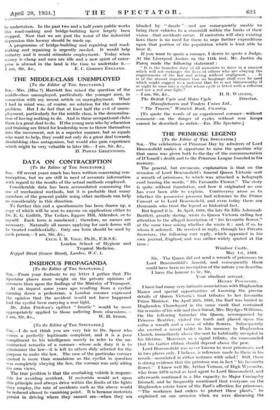[To the Editor of THE SPECTATOR.]
SIR,—I do not think you are very fair to Dr. Spoor who voices a perfectly legitimate, complaint, and it is a poor compliment to his intelligence merely to refer to the un- instructed remarks of a coroner—whose sole duty it is to administer the law—it is left to others duly selected for the purpose to make the law. The case of the particular coroner quoted is more than scandalous as the, cyclist in question was completely obeying the law, the coroner was only airing his own views.
The true position is that the overtaking vehicle is respons- ible for avoiding accident. If motorists would act upon this principle and always drive within the limits of .the lights they employ, the rate of accidents such as the above would be reduced almost to vanishing point. It is because motorists persist in driving where they cannot see—when they are
blinded by " dazzle "—and are consequently unable to bring. their vehicles to a standstill within the limits of their vision—that accidents occur. If motorists will obey existing laws there is no need for them to urge further expenditure upon that portion of the population which is least able to bear it.
If you want to quote a coroner, I desire to quote a Judge. At the Liverpool Assizes on the 11th inst. Mr. Justice du Parcq made the following statement :
" It is the bounden duty of all motorists to drive in a manner which will not endanger the lives of others who are obeying the requirements of the law and acting without negligence. . . . It is of the utmost importance that no language shall ever be used which might suggest. to a motorist that he is not blameworthy if at night he runs into a cyclist whose cycle is fitted with a reflector and not a rod rear light." '
—I am, Sir, &c., H. R. WATLING,
The British Cycle and Motor Cycle Director.
Manufacturers and Traders Union Ltd., " The Towers," Warwick .Road, Coventry.
[To quote the words of an experienced coroner—without comment—on the danger of cycles without rear lamps cannot be described as unfair.—En. The Spectator.]












































 Previous page
Previous page